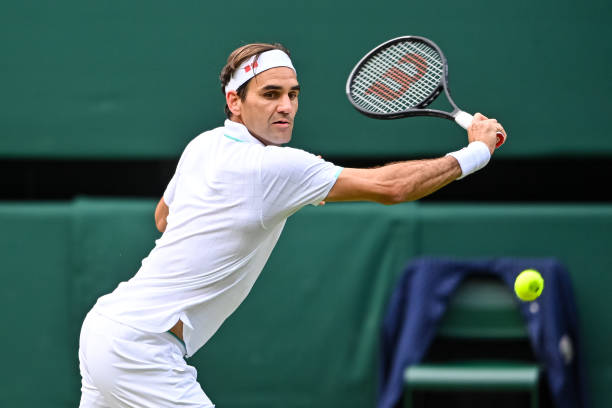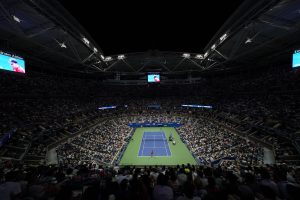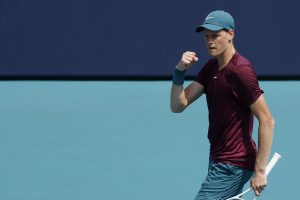After a long-time absent from the ATP Tour and professional tennis, Roger Federer has announced his retirement after this year’s Laver Cup, the Laver Cup will mark the end of his storied career, where he has a claim to be made as the greatest of all time, despite the end of his career being marred by injury issues that limited him significantly physically. His shotmaking abilities never diminished.
with countless records and titles to his name. Here are Roger Federer’s best matches from each decade on the ATP Tour.
2020’s: Roger Federer vs Dan Evans, Doha, Round of 16
What better place to start than Roger Federer’s return to tennis in 2021. 405 days on from his last match, Federer lined up against world no.28 Dan Evans in the round of 16. The Brit went into the match having captured his first career title earlier in the year. He beat Felix Auger-Aliassime in the Melbourne 2 final 6-2, 6-3. Federer was returning to the tour after a double knee surgery, but had built up playing time hitting with Evans in Dubai for over two weeks.
Federer breezed through his service games in the opening set, holding games two and three to love. We were seeing vintage Federer, with impeccable movement and a variety of drop shots and winners only the Swiss maestro could pull off. Twelve strongly contested games saw a tiebreak, with Federer holding match point at 5-6 on his serve. He would pull out an audacious cross-court backhand to snatch the first set 10-8 on Evans serve.
Evans would eventually break Federer in the second set where a hint of fatigue set in for Roger. We were beginning to see the affects of a year out, balls going long and some even out of the court. Evans was resilient in his play, a mix of slice backhands and powerful forehands seeing him take the second set 6-3.
The final set would see Federer demonstrate the genius we have all come to expect of the 20-time Grand Slam winner. Federer held a match point from the Evans serve as a tiebreak appeared likely. However, serving at 5-6, Evans gifted Federer the match. Double faulting the first point, Evans would net the next two before a Vintage Federer backhand saw his return to tennis a victorious one. Perhaps more encouraging is no double faults in the two hour and 25 minute match. This shows the knee is strong off serve, and Federer was onto the next round with a 100% winning record in 2021.
2010’s: Roger Federer vs Rafael Nadal, Australian Open 2017, Final
It’s difficult to believe there was once a time where Roger Federer and Rafael Nadal were 9th and 16th seed for the Australian Open. Federer had not played since Wimbledon in 2016 where he lost to Milos Raonic in the semifinal. He was also suffering a four year lull of Grand Slams, failing to win a major since 2012 at the All England Club. Nadal was at 100% fitness for the first time since mid-May in 2016 and was suffering his own title drought. He last lifted a slam at Roland Garros in 2014. However, despite many doubting the two and perhaps assuming we’d never see the two face off in a Grand Slam final ever again, Federer and Nadal produced an instant classic.
The two hit unprecedented levels during the first four sets, heights we hadn’t seen since their last Grand Slam wins. Federer came out the blocks strong to take the opening set 6-3 whilst only dropping four points on serve. Nadal ran away with the second set after an early break saw him take a 4-0 lead, serving to love to draw level. Federer broke Nadal in his first service game in the third and ran away with the set, only dropping a single game as he took a 2-1 lead. Both were failing to hit the peak of their powers, and Federer was the one to slip in the fourth. Nadal would take the fourth set 6-3, forcing a medical time out for Federer and heading into the decider in better form.
The fifth set would prove pivotal in the resurgence of Roger Federer’s career. He fell behind in the fifth set after receiving treatment to his left thigh. Many feared the resilience of Nadal would lead him to a 15th title. However, Federer broke back to draw level, converting his sixth break point in the set. The Swiss swept through his next service game before a rally that would change the course of the year for Federer. 26 shots between the titans ended with a crushing forehand from Roger and a roar from the Rod Laver arena heard across Australia. He would face difficulty closing out the game, fighting back from 14-40 down, but a hawk-eye call in his favour would lead Federer to the title and kickstart a historic year for the Swiss.
2000’s: Roger Federer vs Andy Roddick, Wimbledon 2009, Final
Andy Roddick must wish his rise to the top of the tennis pyramid came five years sooner or later. A player capable of beating anyone on their day, with a ferocious serve and powerful ground strokes, the American’s single Grand Slam title does not reflect how good he is. His problem? Roger Federer’s meteoric rise came at the same time.
The two have met 24 times, with Federer holding a 21-3 record over Roddick and besting him three times in Grand Slam finals before their clash in 2009. Federer was the one to end Roddick’s last stint as world no.1, overtaking the American in 2004 to begin his record setting 237 consecutive weeks at the top. Going into their final in 2009, Federer had won their last encounter in comfortable fashion. The Swiss beat Roddick in straight sets at the Australian Open, and had only dropped a single set at Wimbledon before their clash.
The first set proved entirely even until a late break saw Roddick take the first set. In the second set, the two were inseparable once again. A tiebreak saw Roddick take an early advantage, leading 6-2 before Federer saved four set points to take the tie to 6-6. Two more points in Federer’s favour levelled scoring, taking the third set in the second of three tiebreaks in the match. Roddick was able to break momentum in the fourth set with a backhand pass, and held to take the fourth set 6-3. Going into the deciding set, Federer was yet to break the American’s serve. However, one lapse in an almost perfect service game saw Roddick squander his best chance of besting Federer in a Grand Slam final.
The two were once again resilient in their service games, either failing to break the opponent. What spawned was a gruelling 30 game set, leaving Federer victorious after 95 minutes in the fifth. Both players held until the score was 15-14 in favour of Federer. Roddick had two break points at 9-8 but could not convert. In what would prove to be the only time the American was broken all match, Roddick mishit a forehand to give Federer his first break point. He would capitalise and eventually serve out the match to win 16-14 in the fifth set. This title would break Pete Sampras’ record of 15th Grand Slams, with Federer’s sixth at the All England Club.
1990’s: Roger Federer vs Carlos Moya, Marseille 1999, First Round
Whilst Roger Federer made his first appearance on the ATP Tour in 1998, suffering a straight set loss to Lucas Arnold Ker at the Swiss Open, his best win in the 1990’s would come during his second year on tour. This would be the year he entered Wimbledon for the first time, as a wildcard, losing to world no.59 Jiri Novak in the first round. His Grand Slam debut came at the French Open, losing to Patrick Rafter after a four set clash. However, his best match of the decade came at the expense of former world no.1 Carlos Moya.
Federer entered the Marseille Open for the first time in 1999 as a wildcard. The tournament came early in the year, with the 17-year-old starting the season ranked 301st in the world. He was drawn against top seed Carlos Moya, only months out from his first stint as world no.1. Moya had won the French Open and Monte Carlo the previous year. Federer ended 1998 ranked as the top rated junior and awarded ITF junior World Champion.
In his first match at the tournament, Roger Federer would upset Carlos Moya to beat the top seed 7-6 (1), 3-6, 6-3. This would start his surge to the top, breaking into the top 100 for the first time and finishing the season ranked 64th in the world. Federer would face Moya a further six times, besting the Spaniard in every encounter. He would also reach the final of Marseille the following year, falling short to fellow Swiss Marc Rosset. The title would eventually be his in 2003, entering as the first seed and beating Jonas Bjorkman in straight sets to capture his 9th career crown.
Roger Federer’s career spans decades, with each year passing another closer to his eventual retirement. However, the Swiss maestro has produced some undeniable classics, going toe-to-toe with the best players from every generation and cementing his status as one of the greatest to ever grace the court.
Main Photo:





